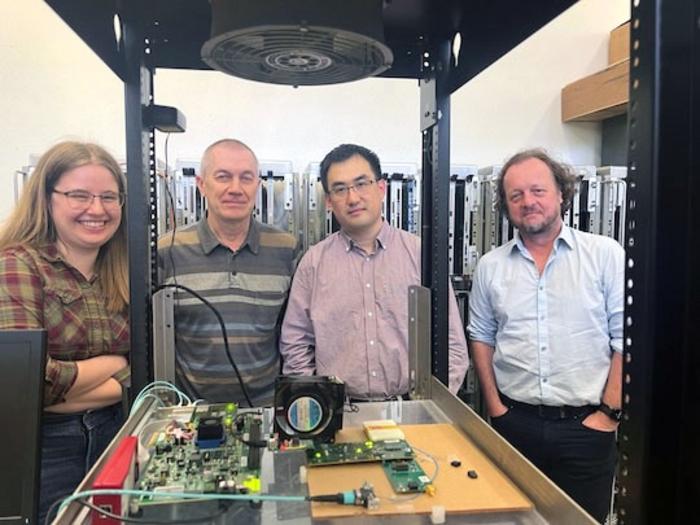A team of physicists at Rice University led by Wei Li has been awarded a five-year, $15.5 million grant from the U.S. Department of Energy (DOE) Office of Nuclear Physics, marking a significant leap forward in the realm of high-energy nuclear physics.

Credit: Photo courtesy of Rice University
A team of physicists at Rice University led by Wei Li has been awarded a five-year, $15.5 million grant from the U.S. Department of Energy (DOE) Office of Nuclear Physics, marking a significant leap forward in the realm of high-energy nuclear physics.
This prestigious grant will pave the way for a new frontier of scientific discoveries within the Compact Muon Solenoid (CMS) program.
The CMS experiment is one of two large general-purpose particle physics detectors built on the Large Hadron Collider (LHC) at CERN, the European organization for nuclear research located on the border of France and Switzerland.
The team from Rice includes co-principal investigator Frank Geurts and researchers Nicole Lewis and Mike Matveev.
Under Li’s guidance, a collaborative effort between Rice, the Massachusetts Institute of Technology, Oak Ridge National Lab, University of Illinois Chicago, and University of Kansas will embark on the development of an ultra-fast silicon timing detector named the endcap timing layer (ETL). This cutting-edge technology forms a crucial component of the CMS experiment’s upgrades and is poised to revolutionize our understanding of fundamental physics.
“The ETL will enable breakthrough science in the area of heavy ion collisions, allowing us to delve into the properties of a remarkable new state of matter called the quark-gluon plasma,” said Li, a professor of physics and astronomy at Rice. “This, in turn, offers invaluable insights into the strong nuclear force that binds particles at the core of matter.”
Key features of the ETL include two disks on each side of the CMS detector accounting for half of the entire international ETL project and boasting a time resolution of 30 picoseconds per particle.
The detector will enable unprecedented particle identification capabilities through precise time-of-flight measurements, contributing to the High-Luminosity Large Hadron Collider (HL-LHC), an upgrade to the LHC that is scheduled to launch in 2029. The HL-LHC will operate at about 10 times the luminosity of the collider’s original configuration.
Increasing luminosity produces more data, allowing physicists to study known mechanisms in greater detail and observe rare new phenomena that might reveal themselves. For example, HL-LHC will produce at least 15 million Higgs bosons per year compared to around three million collected during LHC operation in 2017.
Upon completion, the ETL will enable the investigation of a wide range of physics, including not only the study of quark-gluon plasma and the search for the Higgs boson, but also for extra dimensions and particles that could make up dark matter.
Beyond its impact on the LHC, the results of the ETL project hold tremendous potential for synergy with other leading-edge facilities like the electron-ion collider at DOE’s Brookhaven National Laboratory in Long Island, New York. The project is set to shape the scientific landscape in the coming decade.
Li received his Ph.D. in experimental particle and nuclear physics at MIT in 2009. Following a postdoc position at MIT working on the first relativistic heavy ion physics program on the CMS experiment at the LHC, he joined the Rice faculty in 2012. His work has been recognized with a White House Presidential Early Career Award for Scientists and Engineers, an Early Career Award from the DOE and a Sloan Research Fellowship.
This grant is administered by the DOE (DE-SC0024846).




